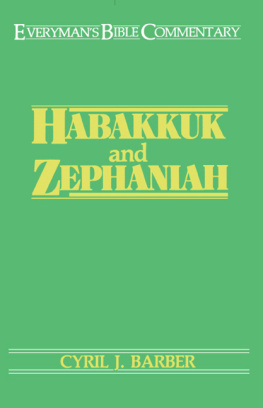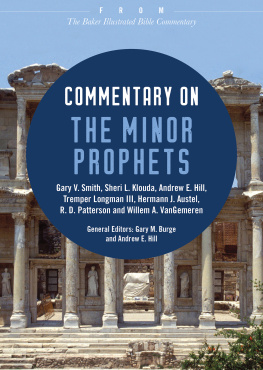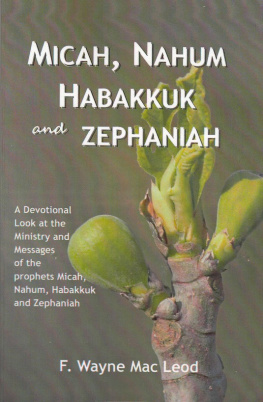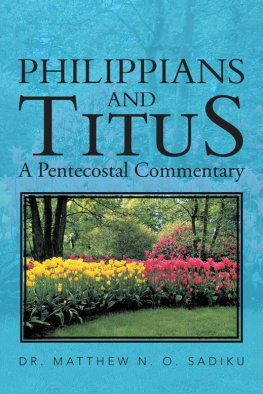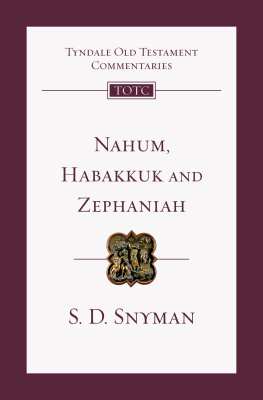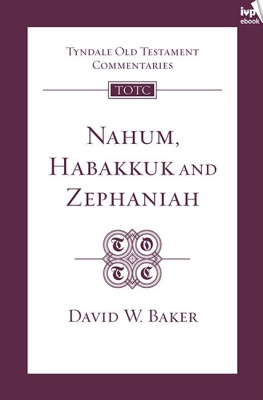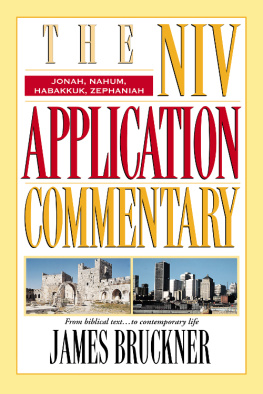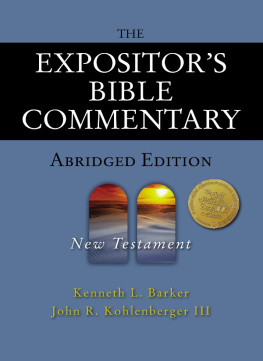HABAKKUK
AND
ZEPHANIAH
HABAKKUK
AND
ZEPHANIAH
by
CYRIL J. BARBER
MOODY PRESS
CHICAGO
1985 by
T HE M OODY B IBLE I NSTITUTE
OF C HICAGO
All rights reserved. No part of this book may be reproduced in any form without permission in writing from the publisher, except in the case of brief quotations embodied in critical articles or reviews.
Unless otherwise noted, all quotations and/or paraphrases of Scripture in this book are the authors.
Selected references from the New American Standard Bible, 1960, 1962, 1963, 1968, 1971, 1972, 1973, 1975 and 1977 by the Lockman Foundation are used by permission.
Library of Congress Cataloging in Publication Data
Barber, Cyril J.
Habakkuk and Zephaniah.
Bibliography: p. 127
1. Bible. O.T. HabakkukCommentaries.
2. Bible. O.T. ZephaniahCommentaries. I. Title.
BS1635.3.B37 1985 224.9507 85-2960
ISBN 0-8024-2069-9 (pbk.)
5 7 9 1 0 8 6 4
Printed in the United States of America
For
S HARALEE A SPENLEITER
Coauthor, Colleague, Friend.
In sincere appreciation and
affection.
CONTENTS
CHAPTER
When a well-worn Bible is allowed to fall open at random, the possibility of its opening at the book of Psalms or the gospel of John or one of the epistles is good. Even among zealous Bible students, the books of Habakkuk and Zephaniah are seldom read. One is tempted with the thought that if they were somehow surreptitiously removed from the Bible, they would not be missed.
But why have these books been so neglected?
In Habakkuk, we encounter difficulties in translation (particularly in chap. 3) that are perplexing and hard to unravel. The late George Adam Smith, for many years principal of the University of Aberdeen, Scotland, stated in his exposition of the Minor Prophets, The Book of Zephaniah is one of the most difficult in the prophetic canon. Without doubt, the interpretive difficulties surrounding the writings of this Old Testament prophet have turned many away.
That which follows in the pages of this book is not intended for scholars. My aim in expounding these prophetic writings has been to explain the central purpose of each book. In doing so, I have attempted to adhere to a consistent literal hermeneutic. Those who have attempted to grapple with the diversity of literary forms found in these writings know better than to be dogmatic. What I have presented, therefore, I hope will stimulate further inquiry into these long-neglected portions of Gods Word.
I want to say a very special word of thanks to Philip Rawley, former textbook editor, Moody Press, for inviting me to contribute to the Everymans Bible Commentary series. In addition, I would like to express my gratitude to my secretary, Mrs. Michael (Marilyn) Moore, and my research assistant, Mrs. Steve (Janet) McCracken, without whose indefatigable efforts this manuscript would not have been ready on time.
The book of Habakkuk was written to people facing changeimminent changein their political, economic, social, and religious lives. As such, it has a direct bearing upon contemporary society.
In his book Managing in Turbulent Times, Peter Drucker points an unerring finger at Western civilization and warns of the irregular, non-linear, erratic times facing modern society. He describes the twenty-five years following World War II and shows how a high degree of continuity and productivity characterized the West, as well as the emerging Third World countries. Now, however, an era of rapid change has begun that calls for new strategiesstrategies that can anticipate the changes that surely will come.
A time of turbulence is a dangerous time, he writes.
Its greatest danger is a temptation to deny reality. The new realities fit neither the assumption of the Left nor those of the Right. The greatest and most dangerous turbulence today results from the collision between the delusions of the decisionmakers and the realities [facing us at the present time].
In that respect, there is a remarkable correlation between the situation today and the one that faced Judah in the days of Habakkuk. The peace that had accompanied the reign of Josiah (640-609 B.C. ) had allowed the people to enjoy a greater degree of prosperity than had been possible for many years. In a real sense they thought the new era would last indefinitely. The realities that faced them, however, could not have been anticipated by either the political liberals or the religiously-minded conservatives.
The power of Assyria had collapsed. Political supremacy belonged to Egypt. Strong political ties, however, had been established with the emerging kingdom of Babylon. Because she was a vassal of Egypt and a friend of Babylon, it seemed as if nothing could threaten the progress of Judahs prosperity.
The nation owed its prosperity to Gods favoring of one man, Josiah (2 Kings 22:1, 12-17). Josiah had led the nation in several notable reforms. Although those reforms touched only the outward observances of the people, God said He would honor Josiah for his faithfulness (2 Kings 22:18-20).
The leaders of the people ignored the spiritual reasons for their material prosperity and thought Gods favor could be enjoyed without interruption. J. Gresham Machen once remarked, America is running on the momentum of a Godly ancestry. When that momentum goes, God help America! The same could be said of Judah in Habakkuks day. It was not long before greed and avarice became prevalent. The rich exploited the poor. Justice favored the wealthy. Those who were God-fearing found themselves oppressed by an ever-increasing number whose desire for power led them to secure, by one means or another, those positions that met their personal (and often pathological) needs.
It was amid such conditions that God revealed His will to Habakkuk. Turbulent times lay ahead for the Lords people. The message Habakkuk was told to proclaim was one that would please neither the Left nor the Right. The delusions of the decision makers were to be dashed to pieces before the harsh reality of Gods sovereign justice.
I. A UTHORSHIP AND D ATE
The book of Habakkuk takes its name from its author. Today practically nothing is known of Habakkuk, though much conjecture has arisen about him. It is thought by some that his
Little information can be gleaned about Habakkuk from either the Septuagint or the Vulgate translations.
Several clues as to the prophets identity are to be found in his record of Gods revelation. Those clues are not numerous. Habakkuk did not follow the usual policy of dating his prophecy in the reign of a king (cf. Zeph. 1:1), but he did state that he was a prophet (lit. the prophet). Inasmuch as the term denoted an official position (cf. Nah. 1:1), he must be accorded a place with the other men and women in the Old Testament who spoke forth the word of the Lord. The reference in 2:2 supports that identity and tacitly intimates that those in the prophets time who read what he had written would respond to the message communicated to them.
A further clue as to Habakkuks identity may be gleaned from references in 3:1 and 3:19d. The former is a musical ascription, Shigionoth, and the latter is a subscription at the end of the book, For the choir director, on my stringed instruments (NASB). The references support one another and may intimate that Habakkuk was a Levite and a singer in the Temple.
It is interesting to note the extent to which legend has grown up around the person of Habakkuk. In past times some rabbis have imagined that there was a connection between his name and the words the prophet Elisha had spoken to the Shunammite woman to assure her that she would embrace a son (2 Kings 4:16, NASB). Those rabbis have believed that Habakkuk was the womans son. Others have seen a link between Habakkuks vigil of 2:2 and a vigil described in Isaiah 21:6. Those who adhere to that theory are quick to identify the prophet with the watchman appointed to stand upon the walls of Jerusalem and watch for the fall of Babylon.

